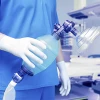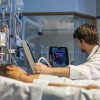17 careers found.
Pharmacists supply, dispense and manufacture medicines and pharmaceutical products in hospitals and community pharmacies, and advise on their appropriate use. They also conduct research into the formulation, production, storage, quality control and distribution of medicines and pharmaceutical products.
Pharmacologists evaluate the origin, effects and mechanisms of drugs and develop them for human and animal use.
Anaesthetic technicians prepare and maintain anaesthetic equipment for operating theatres and clinics, and assist anaesthetists during anaesthetic procedures.
Animal technicians help veterinary, medical, pharmaceutical, agricultural and general scientists and students to care for and check on animals used for research, breeding and scientific purposes.
Audiometrists test hearing by administering audiometric tests to enable the rehabilitation of hearing loss through counselling and/or the fitting of hearing devices. They may refer or report to a medical practitioner or an audiologist as required.
Biotechnologists study plants, animals and microorganisms. They use this knowledge to develop uses for biological processes, which include creating products for pharmaceutical, agricultural, diagnostic and environmental use, and advancing industrial processes. Their work may incorporate the use of small molecule technologies, nanotechnology, bioinformatics and synthetic biology.
Cardiac technologists provide technical services for the investigation, diagnosis and treatment of heart disease. As part of the cardiology team, cardiac technologists operate a range of specialist equipment, which provides data that cardiologists and other medical practitioners use for patient care.
Chemical engineers design and coordinate the construction and operation of manufacturing facilities and processes that convert raw materials into everyday products such as petrol, toothpaste, pharmaceuticals and plastics.
Chemists study the physical and chemical properties of materials to determine their composition. They use this information to develop new materials and products, to devise more efficient processes for making materials and to increase scientific knowledge. Chemists should not be confused with pharmacists (see separate entry for Pharmacist).
Dispensary assistants work under the supervision of a pharmacist to prepare medicines, advise customers on non-medicinal products and assist with stock control.
Food process workers operate machines and prepare foods for processing using a wide range of equipment and methods.
Medical imaging technologists operate X-ray and other imaging equipment, such as magnetic resonance imaging (MRI) and ultrasound, to produce radiographic images that are used in the diagnosis and subsequent management of disease or injury. Experienced medical imaging technologists may be able to develop further skills in image interpretation.
Medical laboratory technicians carry out routine laboratory tests and other procedures used in the diagnosis and treatment of diseases and disorders of the human body.
Operating theatre technicians prepare and maintain operating theatres and equipment, assist surgical and anaesthetic teams during operations, and provide support to patients in recovery.
Process plant equipment operators use machines and equipment to produce chemicals and chemical products such as soaps, detergents, pharmaceuticals, toiletries and explosives.






